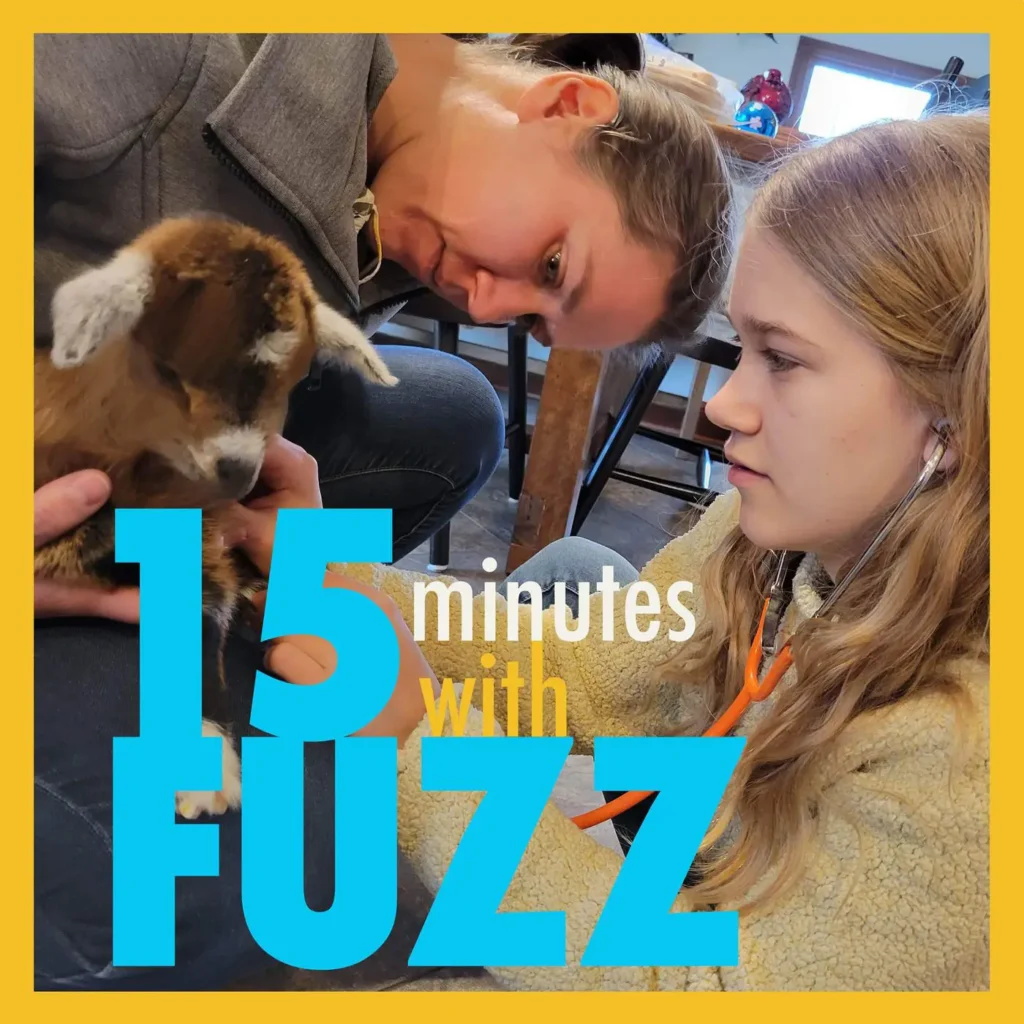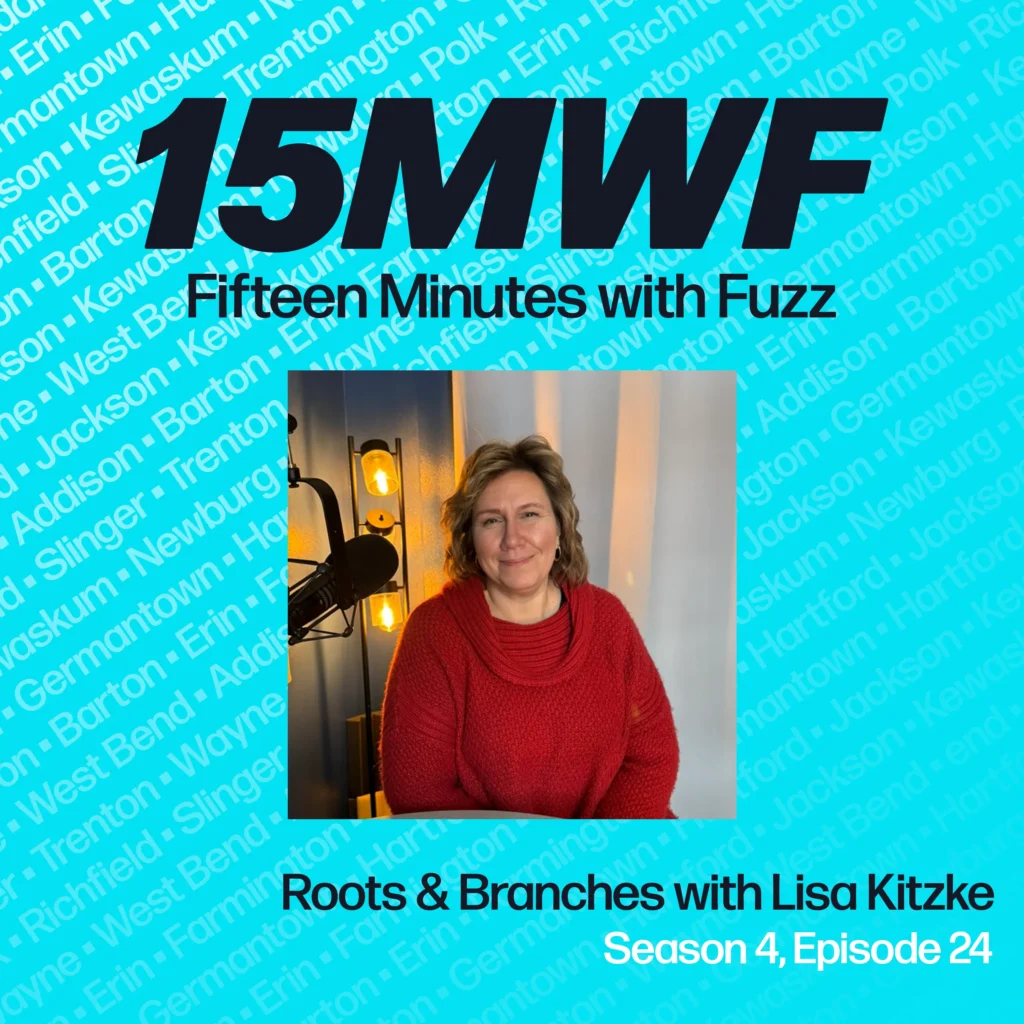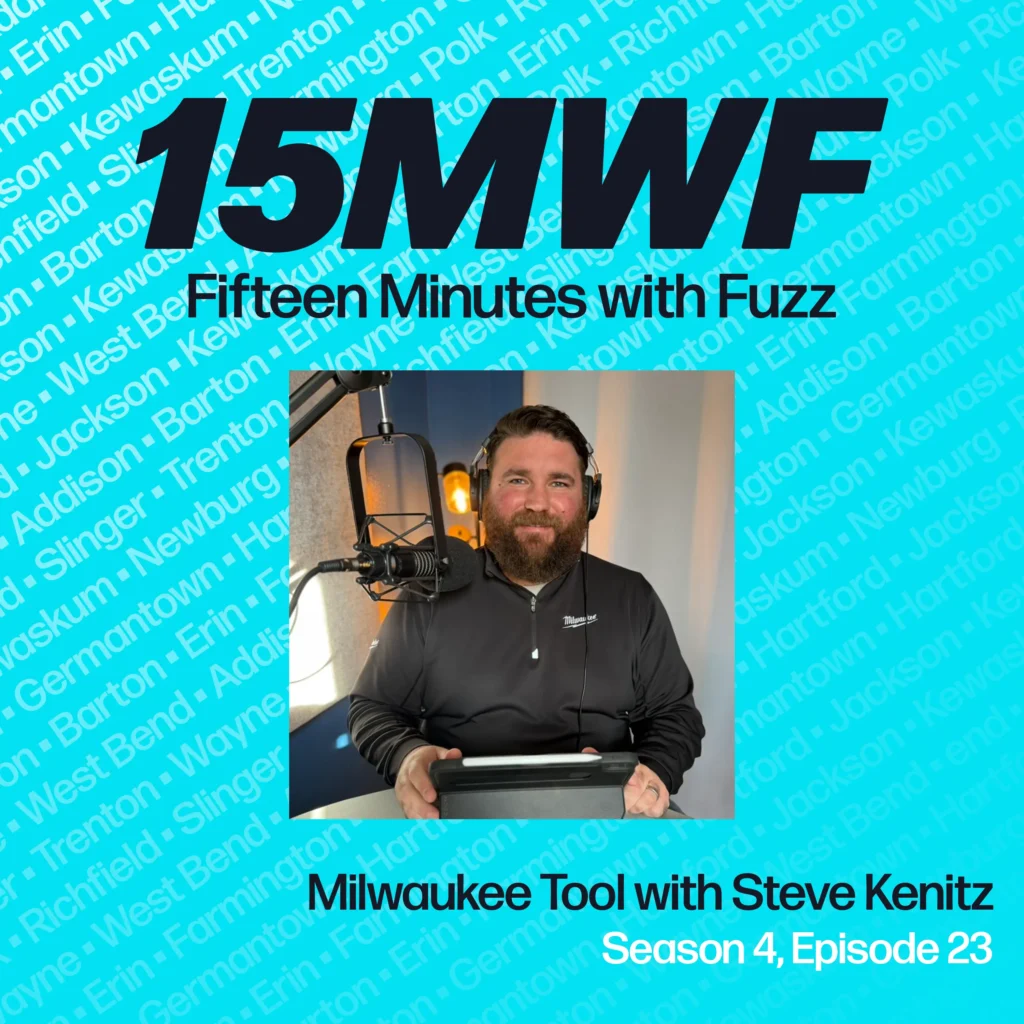[00:00:00] Fuzz Martin: Head, heart, hands, health. Those are the four H’s in 4 H. That’s what they stand for. I’m not sure if you knew that. Maybe you did. I certainly didn’t. And I needed to look them up before this interview. Thanks for listening to Fifteen Minutes with Fuzz. I’m your host, Fuzz Martin. And on this show We explore all the fun and positive things happening around Washington County, Wisconsin.
We’re super local. I really want to highlight the things that we’re not seeing every day on social media that some people may have misconceptions about or that we might all take for granted now and then. I created this show partly to level set myself. I’ve been looking at all the negative things that go on on Facebook groups or even just in the community right now with everything going on and I wanted to have something of a palate cleanser for me and hopefully for you as well.
So that’s what Fifteen Minutes with Fuzz is all about. On this week’s show, we talk about an organization that does a lot of good for this community’s youth. But you might not think of them all the time. I’m sure you’ve heard of them. It’s Washington County 4 H. And I’m joined this week by Cassie and Jennifer Jarisch, and they helped me learn a few things.
And I’m sure you’ll learn a few things too.
All right. I have to ask my first question that I’ve been dying to ask because I’ve always thought this, right? So Cassie. Do you have to own animals to be in 4 H?
[00:01:51] Cassie Jerich: No, uh, we have over 80 projects in 4 H, and over half of them are not even related to, uh, animals at all. If you are interested in animals but you’re not able to have them of your own, you can have, you can do things where you can use someone else’s animal, and you can still show it at our fair.
[00:02:09] Fuzz Martin: Cool. Very good. And it was at the Washington County Fair. Did you show animals at the Washington County Fair this year?
[00:02:14] Cassie Jerich: Uh, not this year. We actually have three goats at home that we love showing, but we went on a family trip in early June, so we weren’t able to show them this year, but next year we’re definitely going to.
[00:02:25] Fuzz Martin: It’s a lot of work to get animals ready for a show, isn’t it? Oh yes. Our goats are naughty a lot of times, so it’s an extra little piece of work there. Very good. And they eat a lot of stuff, don’t they? Partially. Some goats are super picky, and then some goats are not. Fuzz. So it’s kind of interesting. Jen, I, did you say your goats eat Christmas trees?
Is that what I heard once?
[00:02:46] Jen Jerich: Yeah. So you have to be careful to not have them be treated, but yeah, they love Christmas trees. It’s like a little treat.
[00:02:52] Fuzz Martin: Oh man. Um, delicious, delicious Christmas trees. Uh, Cassie. How old are you now?
[00:02:58] Cassie Jerich: I’m gonna be 14 in a month.
[00:03:00] Fuzz Martin: And when did you get started in 4 H?
[00:03:03] Cassie Jerich: I started when I was in kindergarten, though anyone who’s willing to join 4 H can start at any time.
Um, it’s for people in kindergarten up to their college year, the first year that they start college.
[00:03:15] Fuzz Martin: Jen, did you, were you in 4 H when you were younger, or?
[00:03:18] Jen Jerich: Yeah, I wasn’t, uh, but my mom was and she had a sheep and, um, she just always talked about 4 H and so I grew up in the city outside of Chicago and I just knew when I had kids it would be something I’d want them to be involved in and it’s grown to be just an amazing experience for them.
[00:03:33] Fuzz Martin: Cassie, what kind of things do you do at 4 H? You were talking about service projects and such, let’s talk about those.
[00:03:39] Cassie Jerich: So there’s a bunch of different things that you can do in 4 H. Kind of the main thing that people think of when they think of 4 H is the projects that we get to do. So there’s a lot of different kind of projects in 4 H.
There’s a whole wide variety. But then other than that, there’s a lot of leadership experiences. So in each of our clubs, you have a chance to be an officer, like a treasurer or secretary or president, and you get to learn how to do certain things. Like when you treasurer, you get to learn how to deal with money and Write checks and all that stuff.
You also get to learn more of the administrative side of 4 H. Like right now I’m on leaders board for Washington County, which is kind of like helping making decisions for all of Washington County or whatever. So then we kind of get to learn more of how much of that other work and adults kind of go into 4 H.
[00:04:25] Fuzz Martin: Sure. What kind of things come out of those meetings in terms of like what decisions do you make and stuff like that?
[00:04:33] Cassie Jerich: We make a bunch of different decisions, to be honest with you. Um, it kind of depends on the time of year and the meeting. When it’s near fair, we’re mainly making decisions on, like, uh, where is the silent auction going to be, because we have a silent auction at our fair.
And, um, what time, so the foods, the 4 H food stand is going to run for us, because we help, um, we have a food stand that we run during the fair to help promote 4 H and to be able to, We get some money to be able to put into other things like trips, and we also get to do a bunch of different fun things, different committees or whatever, that we can kind of get into stuff, like new stuff that we haven’t thought of that you could even do before in 4 H, and then stuff you’re interested in.
[00:05:18] Fuzz Martin: Jen, would you say this has helped Cassie in terms of like, growing up and learning some of the life skills?
[00:05:24] Jen Jerich: Yeah, I think one of the huge advantages of 4 H, besides being able to grow with your child, so if your child starts out being interested in robotics and rocketry but then has a friend who is in Llama Project and suddenly they’re showing a llama, so there’s growth from that perspective of just getting exposure.
But some of the things Cassie was talking about in terms of leadership skills, being able to speak to judges, just sort of random adults, the leadership, the leaders board specifically, I’ve seen a huge amount of growth in all the youth on it because it really is, it’s made of eight adults and eight youth and the youth play an equal role.
So they definitely are involved in making the decisions and thinking through, well, if we have this much money, where do we want to spend it? And how can we grow 4 H and be inclusive? To all kids.
[00:06:12] Fuzz Martin: Yeah, absolutely. Cassie, what are some of your favorite projects that you’ve done?
[00:06:17] Cassie Jerich: That’s a very tough question.
Um, I’ve been in a lot of projects, but I would say, I can’t really choose just one. You don’t have to. I would say my favorites are probably archery, basketry, and goat. And goat? Yeah. Um, and so what are goats names, by the way? Uh, Doc, Gilbert, and George.
[00:06:41] Fuzz Martin: Very nice. Um, strong names, good strong goat names. What has changed since when you started in kindergarten until now?
What, how has, how has it changed for you?
[00:06:52] Cassie Jerich: Well, um, between kindergarten and, uh, through second grade, you get to be in Clover Buds, which is basically, you don’t actually get to be in any projects yet, but you get to do, like, fun workshops, and you still get to show stuff at fair, and then starting in third grade and beyond, you get to start doing projects and showing stuff, like, actually showing things during those projects at fair, and when I started out, So, in kindergarten through kind of third grade or whatever, I was more interested in the project side of things, but now I’m getting more interested in like the administrative and the leadership side of things, which is kind of a completely different side of 4 H.
I think that’s one of my favorite parts of 4 H, is that you can do so many different things and explore so many different things about it. Yeah, I, it sounds like they’re just great skills to have, whether you’re going to work with animals or just, you know, do anything in life. Some of those skills are, are invaluable.
[00:07:47] Fuzz Martin: Jen, what is the time commitment like from a family perspective?
[00:07:50] Jen Jerich: I think that’s one of the things I love about 4 H the most is the basic commitment really is being in a club. And most clubs will have some sort of like, you should attend 70 percent of the meetings and they meet monthly. Beyond that, it’s really up to you.
So there’s literally kids who are in one project and that’s it. And then there’s kids who are in lots of projects. And so it’s just like anything else in life. You get out of it what you put into it. But there’s definitely kids who kind of come and go. The 4 H year really runs mostly like January through fair.
So that first half of the year and then things kind of slow down for the fall. Which is nice because it gives kids kind of an opportunity to sort of do other things. Sure. Yeah, it can be a lot or it can be a little. It’s really up to each family. Um, what about the fees? What is the monetary commitment? So what’s one thing that’s really nice about 4 H is it’s actually an arm of UW Extension.
And so there’s budget considerations that are given for that, and then we also do a lot of fundraising. To join 4 H, it’s actually, there’s no fee at all. Um, and then depending on which club you pick, and most people pick a club. Based on, you know, a day of the week and a time of the month that works for them, or, you know, which club has their friends in it, kind of thing.
And, um, like, our club doesn’t have any fee at all. We call it cans. So once a month, the kids, uh, one family goes and collects aluminum cans, and then we use that money instead of fees. Oh, sure. But usually the club fees are, you know, 15 or less a year.
[00:09:16] Fuzz Martin: Let’s talk about the service, uh, project that you guys are doing with the, is it the Washington County Foster Care Closet?
Is that the name of it? Cassie, tell us a little bit about that project.
[00:09:26] Cassie Jerich: So part of the leaders board that we’re on, you get to choose different committees that you want to be on. Yeah. Yeah. And one of the committees that we’re on is the Service Project Committee. So, in that committee, each year we get to choose an organization, which is usually a non profit that we, um, choose to donate something to, whether that’s money or supplies or anything else that they might need.
This year, we had some friends that work at the service pro that the foster care project calls it. And we were kind of like, Hey, what if you guys need kind of help or whatever? So we chose to do, use that as our project for this year, our organization. Um, so what we’re doing this year is we’re collecting bags of toys or games.
And then we’re gonna make bags out of them, or sometimes they come in pre made bags or whatever, and then we send them to the, um, foster care closet, and then they give them out to the kids, um, who are waiting in the, wherever they might be before their foster care parents come or whatever, and then they can also have them for, like, they get to keep them, so you get to have them, like, the whole entire time or whatever.
So, um, yeah.
[00:10:42] Jen Jerich: One of the things about 4 H that I really appreciate is that diversity and being inclusive is a big part of our mission. And so really what we want is for every 4 H youth, regardless of, you know, whatever situation they have at home, is welcome and we’re a safe place for them. And so this Washington County Foster Care Closet seems like a perfect place.
So yeah, kids will get picked up from school and be, you know, not going back home and they will literally have almost nothing. And so they’ll sit at the social worker’s office for some time. And the idea of this is they have kind of a bag of stuff that can keep them busy during that time period.
[00:11:19] Fuzz Martin: Sure, yeah, help reduce some of that stress of being there and things.
[00:11:23] Jen Jerich: Right, exactly. One of the reasons I really like this service project, Is most of the youth and a lot of youth and adults. I didn’t realize what a big demand for foster care families there is in Washington County. We had received sort of a, like a presentation from one of the family members who’s in a different club and I learned a lot.
And so hopefully it’s an opportunity for the youth to really open their eyes. To other people’s lifestyles and sort of situations that may make it really challenging for them. Yeah, certainly. Uh, well that’s a, uh, sounds like a great cause and a, a great project to undertake and kudos to both of you for doing that.
[00:11:56] Fuzz Martin: That sounds awesome. Cassie, if somebody wanted to join four H, what should they do?
[00:12:02] Cassie Jerich: So there’s a bunch of different things that you can do depending on the time of year and depending on what county you’re in or what state you’re in. For Washington County here in August, we have.
[00:12:14] Jen Jerich: It’s September 14th.
[00:12:15] Cassie Jerich: Yeah, September 14th.
I wasn’t positive. So in September then we have a open house Which basically means that most all of the clubs and then some projects go to like this one meeting place Which is usually our fairgrounds and we set everything up and then we have families come who are interested in 4 H to be able to see all the different clubs and all the different projects kind of understand how 4 H works and everything and then otherwise If you are interested in it, so like, say, one of my friends was interested in joining 4 H, she could, they could come to one of my meetings, one of my club’s meetings, or a different club’s meetings, to see how it, how it worked or whatever, and then if they wanted to join, they’d talk to their club leader.
[00:12:59] Fuzz Martin: Very good. I think 4 H is an awesome, uh, organization. It sounds like you’re learning a lot and you’re picking up a lot of life skills and it sounds like it’s very accessible to families and kids of all ages, uh, in Washington County. And, uh, we appreciate you coming on and telling us a bit about it today.
[00:13:16] Jen Jerich: Oh, thanks so much. Yeah. And that open house is on September 14th and yeah, it’ll be at the fairgrounds in the evening.
[00:13:22] Fuzz Martin: Very good. All right, Cassie, thank you.
[00:13:25] Cassie Jerich: Thank you.
[00:13:25] Fuzz Martin: Jen, thank you.
[00:13:26] Jen Jerich: Thank you.
[00:13:27] Fuzz Martin: We’ll talk soon.
That’ll do it. Thanks for listening to Fifteen Minutes with Fuzz. If you ever have an idea for the show, please email me. It’s very easy. Fifteen, that’s fifteen spelled out. Fifteen with Fuzz. at gmail. com, 15withfuzz at gmail. com, or visit our new website. It’s 15withfuzz. com. We have new social media channels rolling out on Facebook, Instagram, and Twitter too.
If you liked this episode or the show as a whole, please share it and help spread the word. I would really appreciate it. Also be sure to subscribe on Apple podcasts, Spotify, or wherever you’re listening right now. It’s very easy. Click follow or subscribe, whatever it says in your app. And if they have a little bell there, click that too.
So you can get notifications. All right. Thanks again. We’ll talk to you next Monday on Fifteen Minutes with Fuzz.




